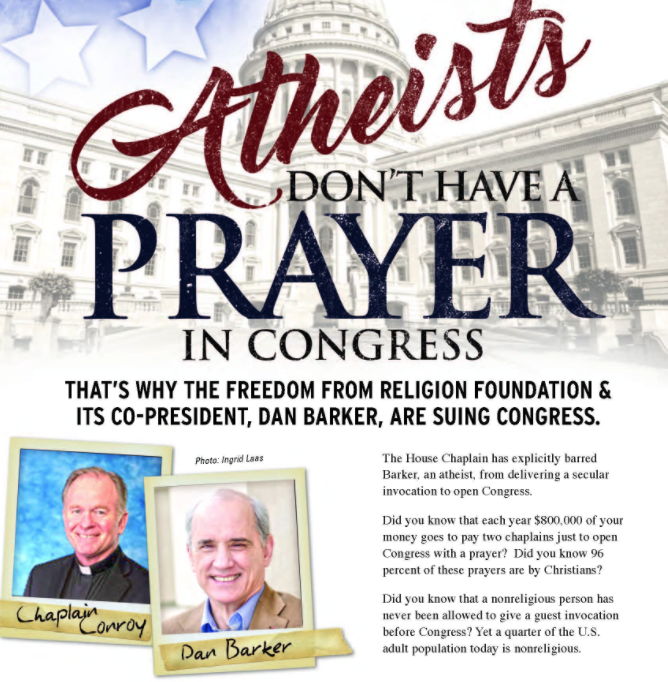The Freedom From Religion Foundation will be presenting its case before the D.C. appeals court on Thursday as part of its legal challenge to open up our nation’s legislative chambers to atheists and freethinkers.
The state/church watchdog filed a brief in May before the U.S. Court of Appeals for the District of Columbia in its nationally watched appeal of a federal court decision permitting the House chaplain to censor atheist invocations.
Dan Barker, who is co-president of the Freedom From Religion Foundation, was invited by his member of Congress, Rep. Mark Pocan, D-Wis., to give an invocation, but was barred as an atheist by Father Patrick Conroy, the priest who serves as House chaplain. Barker is suing Conroy and House Speaker Paul Ryan, who oversees the chaplain. In October 2017, U.S. District Judge Rosemary M. Collyer ruled against Barker in his historic challenge, claiming, among other things, that neither Conroy nor Ryan could ultimately be held accountable for the discrimination against Barker.
Attorney Andrew Seidel, who is FFRF’s director of strategic response, will put forth his arguments in front of a three-judge panel on Thursday, Oct. 18, morning. The judges are David Tatel, Harry Edwards and Douglas Ginsburg. Seidel will base his line of reasoning on FFRF’s plainspoken appeals brief, which states: “House Chaplain Patrick Conroy intentionally denied Daniel Barker an opportunity to present an invocation to members of the House of Representatives because Barker is an atheist.” FFRF has documented that Conroy relies on many “guest chaplains,” with such guests delivering about 40 percent of invocations, or more than 800 in the past 15 years. Yet when an atheist was invited to give the opening remarks, Conroy imposed requirements that intentionally discriminated against him.
Although there are no written requirements to be a guest chaplain, and the practice is generally to permit anyone sponsored by a member of the House, the chaplain’s staff told Barker and Pocan that Barker had to be ordained and to directly address a “higher power” rather than House members. As a former minister, Barker has an ordination, and produced it. He also submitted a draft invocation addressing a “higher power” (“We the People”). More than a year and a half after Pocan invited Barker, Conroy formally disallowed him in December 2015.
FFRF points out that other minorities, such as Buddhists, could be discriminated against based on Conroy’s arbitrary arguments. Some religions do not ordain clergy and some religions do not worship or acknowledge supernatural higher powers. At least one previous presenter failed to invoke a “higher power,” yet was even invited back by Conroy.
Nor did Conroy require other potential guest chaplains to submit written drafts of their invocations, “as a prior restraint,” FFRF notes. All three requirements imposed on Barker by Chaplain Conroy and the House were “disparately applied” and were used “as a pretext to censor content and viewpoints with which they do not agree.”
This case is “simply, but disturbingly, about the intentional and purposeful exclusion of nonbelievers as invocation-givers by the Chaplain of the United States House of Representatives.” Conroy evinced “discrimination, pretext and hostility toward Barker, based on his status as a nonbeliever,” FFRF’s brief concludes.
Standing with Barker and FFRF are a number of secular or state/church advocacy groups, plus three members of Congress. Pocan submitted an amicus, joined by Reps. Jared Huffman, D-Calif., and Jamie Raskin, D-Md., pointing out that Pocan’s constituency in Madison, Wis., polls at more than 50 percent nonreligious.
Americans United for Separation of Church and State also submitted a brief in support of FFRF’s case, joined by a number of groups representing minority faiths or viewpoints: the American Ethical Union, Anti-Defamation League, Central Conference of American Rabbis, Interfaith Alliance Foundation, Jewish Social Policy Action Network; Men of Reform Judaism, National Council of Jewish Women, Sikh American Legal Defense and Education Fund, Sikh Coalition, Union for Reform Judaism, Unitarian Universalist Association, and Women of Reform Judaism. Also submitting briefs in favor of Barker were The American Humanist Association, American Atheists and the Center for Inquiry.
“This support shows the concern by many groups and individuals who are not part of mainstream religions and who see the danger of permitting the House chaplain to engage in viewpoint discrimination based on his own prejudice,” says Annie Laurie Gaylor, FFRF co-president. “Anyone interested in fairness, knowing that today a quarter of the population identifies as nonreligious, should be outraged at the way the House chaplain has treated an invited atheist presenter.”
The Freedom From Religion Foundation is determined to use its appearance before the appeals court to correct this injustice.
For further details and pertinent documents, click here.


